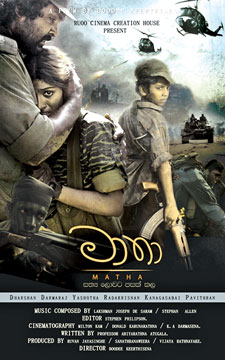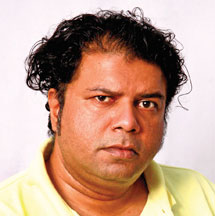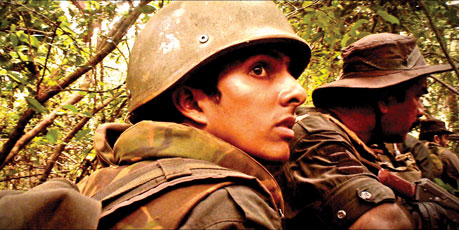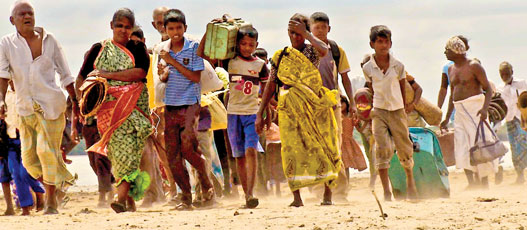|
Vision and the mission of a filmmaker :
The philosophy behind the language of cinema
By Ranga CHANDRARATHNE
 In a wide ranging interview, Vishvanath Buddhika Keerthisena or
Boodee Keerthisena spells out his vision and philosophy behind
filmmaking which is highly influenced by his film education in the USA.
Boodeee studied cinema at the School of Visual Arts in Manhattan. He
presented his feature film Veils of Maya (Sihina Deshayen - 1993) as his
thesis. The film won 31 awards in many festivals including Best Director
and Best Film. In a wide ranging interview, Vishvanath Buddhika Keerthisena or
Boodee Keerthisena spells out his vision and philosophy behind
filmmaking which is highly influenced by his film education in the USA.
Boodeee studied cinema at the School of Visual Arts in Manhattan. He
presented his feature film Veils of Maya (Sihina Deshayen - 1993) as his
thesis. The film won 31 awards in many festivals including Best Director
and Best Film.
In 1997 he started shooting Buongiorno Italia (Mille Soya) and
completed its shooting in Sri Lanka and Italy with a crew from 8
different countries. The film was released in 2004 and was screened at
16 festivals and won 15 awards including best picture and best director.
In 2008 he co-wrote the screenplay and directed Alone in A Valley
(Nimnayaka Hudakalawa).
From 2009-2010 he directed Matha, a film based on the largest
humanitarian rescue in the recent history of the world. In film Matha,
Boodee displays his mature craft and cinematic language with its
overarching Hollywood influence.
|

Boodee Keerthisena |
Excerpts of the interview;
Question: Since your first film, the groundbreaking 'Veils of
Maya,' where do you see yourself now in terms of your cinematic
language?
Answer: Wow! It’s a difficult question for me…cause, its like
asking someone who is going to a university, what did you learn this
year? And they would say, “nothing really”. Then the 2nd year you ask
the same person the same question again, and she or he would say,
“Well…last year we learnt this and this and this year…we didn’t learn
much”. So, on 3rd year you ask the same person the same question and
they would say…”Gee…last two years were great and this year kind of
sucks”. On fourth year you repeat the same question and answer would be
similarly…”Yeah last three years were better than this year…” So when
you ask me where I stand…even though I feel I have not learnt much…but
without knowing I have evolved…my language probably has evolved. I don’t
know if it is better or for worse…but it has evolved.
Propaganda
Q: Do you view cinema more as pure entertainment or a tool for
both social reform and propaganda.
A: For me cinema is entertainment and also knowledge rather
than a Training propaganda tool…yeah but one can very well use it in
both ways.
Q: How influential has your education in the United States
been on your film making process and skills?
 A: It has been very influential in my film making. I mean
don’t forget that just because I went to a university in New York City,
we have been thought only by American cinema. Of course American cinema
of John Ford, Woody Allen, David Lynch and even Blake Edwards has been a
great influence in my work, at the same time great Passolini, Fellini,
Andre Tharkovesky, Fasbinder, Hertzog they have all been an influence,
cause we as students studied their films very closely as well. I went to
America after seeing many great movies by Darmasena Pathiraja, vasantha
Obesekara, and Lester James Peries. A: It has been very influential in my film making. I mean
don’t forget that just because I went to a university in New York City,
we have been thought only by American cinema. Of course American cinema
of John Ford, Woody Allen, David Lynch and even Blake Edwards has been a
great influence in my work, at the same time great Passolini, Fellini,
Andre Tharkovesky, Fasbinder, Hertzog they have all been an influence,
cause we as students studied their films very closely as well. I went to
America after seeing many great movies by Darmasena Pathiraja, vasantha
Obesekara, and Lester James Peries.
Although I discovered Jim Jarmush in America, when I first watch
Jarmush movies like “Stranger Than Paradise” and Down by Law” it
reminded me the great cinema by Darmasena Pathiraja, I saw his
“Paradige” and “Ahas Gauwa” in some of those Jarmush movies. So yes…I
think when u learn filmmaking in a place like Manhattan, your skills of
film making gets a great contribution from cinema from around the world.
And I like it.
Q: Would you encourage young Sri Lankan film students to
follow your footsteps and study in the U.S.? Or do you think that they
would be better served by learning the trade by apprenticing experienced
directors working in Sri Lanka and attending the Sri Lanka Television
Training Institute for instance.
A: Well it’s like this, Sri Lanka is an amazing place to find
your unique stories and topics…there are areas still virgin areas that
Sri Lankan filmmakers haven’t covered yet, like Horror, Sci-fi, teen
movies, feel good movies, and many more.
I would say if one has the passion to work in cinema, it is worth
while educating themselves with the medium, yes if one is serious about
it, better learn the craft at state of the art institute or a
university. Since Sri Lanka does not have any proper film institute,
it’s better to go to a country where there are really cool film schools.
 Manhattan would be a great place, because of its diversified culture
and it is one of the few cities that never sleep. Manhattan would be a great place, because of its diversified culture
and it is one of the few cities that never sleep.
It is a city full of different kinds of art culture, theater, dance,
painting, photography, video art, fashion, poetry, literature, and
different kinds of street artists, and film is made out of all these and
yes it would be a better place to study film over there, but I wouldn’t
call it following my “footsteps” though.
Q: Having started your film career as a cutting edge director
fresh from New York City, you have now, with your latest film 'Matha,'
become more mainstream and commercial? Why is this?
A: First of all, let me be clear on this, before releasing
Matha and people’s reactions, I wouldn’t know if it is main stream or
what not. But it surely is different to all of my other work, and also,
all of my other work is different to each other, cause I like to make
each film different to the other. It is hard sometimes, but I like the
challenge.
Q: I would like to ask you the same question I asked the
composer of Matha, as to why he accepted the project, was it the story
line or the contract fee?
A: There are many reasons to why, I undertook this project. I
always wanted to do a war movie. I have been a fan of war movies since I
was a kid. War is one of my three favorite genera’s. War, Sci-fi, and
fantasy, are generas that I would like to work in.
And the other main reason was, as a Sri Lankan I have had very
shocking and very hard experiences of the war, just as much as many
other Sri Lankans. So when I was offered this project I thought it would
be a great way to tell a human drama through the war.
It’s a challenge I undertook and it was a dream. War is not a
category that every director gets offered in the world, even though it
is a dream of many directors to make a war film. It also gave me a
chance to show the brutality, and horror of terrorism and how it could
affect a society and how it could affect an individual.
We spent one hundred and twenty ( 120 ) days on the shoot and it took
me more than eight hundred ( 800 ) days to complete the film, with
combination of local, Hollywood and Bollywood talent.
It even gave me a chance to pay a homage or tribute, you could call
it whatever, and it gave me the chance to pay homage to Mr. Steven
Spielberg in the scene what me and my editor Stephen Philipson call
“SPR” or Saving Privet Ryan scene where we had a navy SBS beach landing
battle scene in the film.
Brutality
Q: Judging from the theatrical trailer of Matha, it seems like
it is all about brutality, Sri Lankan killing Sri Lankan and property
destruction, these are the realities we have lived with for the last
three decades, is there anything new or another angle in the film for us
that you would like to talk about?
A: Oh! Man! That’s the blame I get from everyone all over,
even in Facebook. See, I had absolutely nothing to do with the
theatrical trailer. It was done by a fellow theatre, TV and film
director, but not me. So I really have nothing to do with the trailer
publicity.
Q: Coming back to the trailer, when the most successful
trailers in the world are not more than 90 to 140 seconds long, why did
you take a record breaking 420 seconds, it would almost seem like you
were purposely giving away all of the most exciting parts of your film,
is this a new trend of trailer making?
Marketing
A: Well, you see when the first need came for a trailer, two
of my assistants put together a trailer which is about 140 seconds long,
which is on “vimeo” and anyone can see it, the link is
http://vimeo.com/25776459. I showed this the director who cut the
trailer, but what’s in the theaters now is what was finally done.
So Ranga they might have made it for marketing purposes, which I am
not really involved in.
So either way I am not responsible for the promotion and the
advertising of the film. Usually the advertising team would talk to the
director consult him before they go forward, but I am sure there are
cases like this one where they would not consult the director.
Q: Tell us something about the producers of this film.
A: Matha is produced by three producers, and they are Mr.Ruwan
Jayasinghe, Mr. Sanath Lanka Ranaweera, and Mr. Wijaya Rtnayeka. Mr.
Ruwan Jayasinghe has produced number of TV series, including Jayantha
Chandrasiri’s “Sathara denek Senpathiyo”.
Q: As a respected award winning film director, what are the
standards you apply when you choose producers, other than the fact they
have some money?
A: Well the first thing is, what they call a producer in Sri Lanka is
way too different to the countries who are very advanced in their
filmmaking. In places like Hollywood and Bollywood, who are considered
executive producers (Funders or people who secure money for the
production) are called producers in Sri Lanka most of the times. Because
when we were working on “Kusa-Paba”, the guild members chose Somartne
dissanayeka as the executive producer and to me the work load he was to
do, looked like he was the “Producer”.
So I tried to correct the terminology, as that he is the producer,
but you all are the executive producers, but they didn’t like the idea
of it and the title to be called that way. So I suppose they have a
different protocol to other film industries around the world. Other than
that, a producer should believe in the project, since he is the one who
is putting it together, and must have a very good relationship,
especially with the director.
Script
Q: How about writers, how selective are you with who you work
with and how important to the film do you think the script is?
A: Well if one decides to work with a scriptwriter other than
the director him or herself, once screenwriter finish the screenplay,
will give it to the director. From there on the writer would let the
director interpret the screenplay according to the director’s
imagination. Most of the time they would talk to each other and exchange
ideas if there are specific scenes to be done in a specific way. Usually
it’s directors call.
I have done projects without a complete screenplay as well. You can
do it by improvising some times. I have also collaborated with other
people and co-wrote screenplays such as Alone in a valley or Nimnayaka
Hudakalawa.
Q: How about the writer of Matha, how close did you work with
him on the script?
A: Well the case in Matha was different, Matha was completely
written by the writer Dr. Athugala. But I was with him since the
beginning of the screenplay. Dr. Athugala invited me to work on this
project as the director. When the screenplay was being written, I was
there with him time to time, we discussed about some scenes and how and
why some scenes should be there.
Consultation
Q: Is it true that you edited a lot of the script, and if so,
why?
A: Obviously we had to change some scenes when I was shooting,
due to many reasons, sometimes, some scenes were not practical when we
are at the actual location with the cast, then I would speak to
Dr.Athugala on the phone and change. Whenever I could, I always
consulted the writer before we changed. Sometimes Due to weather and due
to unavailability of certain things, we had to change. Then when you
work with an editor, some things that you have shot might not work
anymore, so then some scenes gets taken out.
When the length is too much, scenes get taken out. That’s not just in
Matha, but these kind of changes happen in many films around the world,
cause it is a part of film making. But usually director can take out any
scenes if he or she wants to make the movie right, that's the normal
practice around the world. Unless otherwise, they will allow a
"directors cut" as many directors practice that.
Q: Would you like to comment on any other aspect of Matha?
A: I think finally and professionally first time in Sri Lanka
we have introduced VFX Visual effects from computers in Matha. Elephant
and the Mouse, my own company with our own VFX team we managed to finish
nearly about 340 VFX shots. I mean that’s a lot, some time in a movie
like Transformers would have around 350 VFX shots. Also most of SFX
(Special effects on set) was done by some of my friends from Hollywood,
who have worked with filmmakers such as Steven Spielberg, Kevin Costner,
John Woo and many other professionals. We actually gave a boost to Sri
Lankas VFX industry through Matha.
Q: What are you currently working on?
A: I am trying to finish the movie that I started way before
Matha, and also Sri Lanka’s first Digital medium feature film
professionally done, Nimnayaka Hudakalawa. We are doing the VFX works of
that film. Other than that I am trying to get producers to start one of
the three projects I am looking for investors for. One of them is a
Fantasy.
Magic question
Q: What are your predictions on the future of Sri Lankan
cinema?
A: The magic question, you know Ranga if I know the answer to
that, I would be a very happening director by now.
Q: Can you name some new up and coming Sri Lankan directors
who you think we should be paying attention to?
A: You know what, I have come across a few young powerfull
filmmakers who are very active in Facebook and they are actually doing
some interesting work. I hope those guys would get to places soon. |

